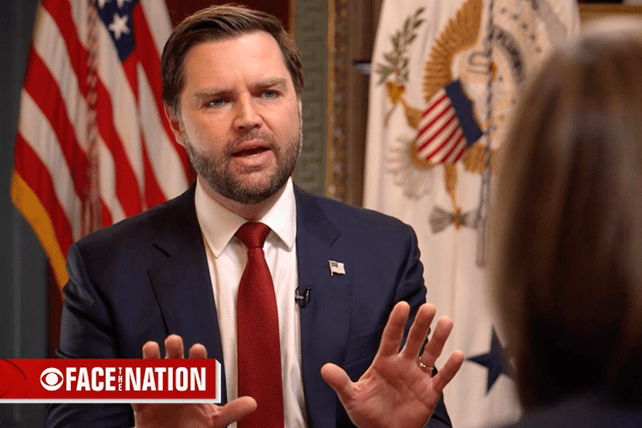(RNS) — On Sunday (Jan. 26), a collection of U.S. Catholic bishops’ staffers met at a Capitol Hill hotel with Catholic advocates and educators at the USCCB’s Catholic Social Ministry Gathering. In a keynote, Emilce Cuda, a Vatican official overseeing Latin American issues, had told her audience that though an inauguration “often heralds a honeymoon of hope,” there was already “an air of unrest,” and that Catholic social workers were already feeling “called to superhuman effort” to get through the next four years.
When they emerged for a coffee break, however, the gathering learned that a even a honeymoon had been too much to hope for.
In an interview that began airing on CBS News’ “Face the Nation” during the break, Vice President JD Vance had fended off criticism from the U.S. Catholic bishops about the Trump administration’s migrant policies. ”If they’re worried about the humanitarian costs of immigration enforcement, let them talk about the children who have been sex trafficked because of the wide open border of Joe Biden,” said Vance, adding later that the bishops had “not been a good partner in common sense immigration enforcement.”
In a line New York Cardinal Timothy Dolan would later call “scurrilous,” Vance went on to suggest the bishops’ thinking was clouded by their concern for the funding they receive for resettling refugees. “Are they actually worried about their bottom line?” the vice president asked.
Just a week into the Trump presidency, the U.S. bishops find themselves in an unaccustomed position: For the first time in history, their character has been called into question by a Catholic standing at the helm of the U.S. government.
Some of their differences with the new GOP are not new: On his first day in office, Trump signed an executive order signaling an intent to expand use of the death penalty, renewing the eagerness to resume federal executions shown at the end of the last Trump administration. While the president seems reluctant to enter new armed conflicts, his administration will continue with weapons sales the pope disapproves of.
At the Capitol Hill gathering, Cardinal Christophe Pierre, the papal representative in the U.S., highlighted “the abolition of the death penalty, advocacy for world peace and the just treatment of migrants and refugees” as three major areas of focus for attendees. But this last policy area has shown the most potential for clash with the new administration.
Though showing signs of reeling internally, the bishops have greeted that unprecedented level of opposition with a low-key statement and renewed their vows to press for humanitarian protections for migrant families.
In his address on ecology to the social ministry gathering on Monday, Bishop Joseph Tyson of Yakima, Washington, made the point that the church’s concern with topics such as human trafficking is at the core of the faith’s theology. Referring to the New Testament’s Letter to the Romans, a first-century text, Tyson told the audience that Paul drew on the ancient reality of human trafficking in forming Christian concepts of redemption and salvation related to the crucifixion, and these realities are still applicable today.
Tyson said that in his agricultural diocese, parishioners have experienced modern human trafficking. A seminarian named Nico, he said, had been kidnapped and tortured in his native Guatemala by men who extorted $50,000 from the young man’s family. “In his bones, (Nico) grasps that we can’t save ourselves. We can’t pay our own ransom. Someone else must do it for us,” Tyson said.
In making connections between the redemption of humans and of creation, the bishop called on attendees to “arrest the desertification of the human heart which has become so vast so we can stop the literal spread of deserts around the world.”
On Tuesday, the bishops’ staffers and Catholic college students in attendance walked to congressional offices on Capitol Hill to attempt to change some hearts, armed with policy booklets urging lawmakers to use tax and economic policy to support poor families in the U.S., foreign aid to support poor families abroad and humanitarian protections for migrants.

